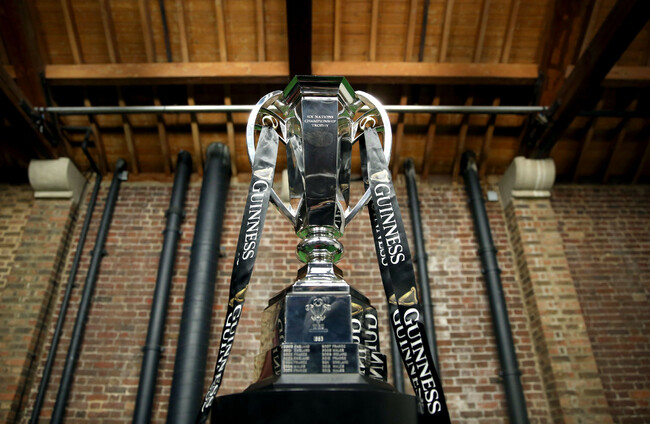EXETER CHIEFS BOSS Rob Baxter believes that playing this season’s Six Nations Championship in one country has “got to be better than cancelling it”.
The tournament is due to kick off in Dublin and Edinburgh on 5 February, but currently finds itself shrouded in uncertainty.
Current restrictions in Ireland, which are to run until the end of this month, mean that sporting events can only be attended by a maximum crowd of 5,000.
Under current Welsh government restrictions imposed due to the coronavirus pandemic and its omicron variant, Wales would have to play scheduled home games against Scotland, France and Italy behind closed doors.
The Scots would be in a similar position for games at Murrayfield if outdoor events remained restricted to 500 people, while it has been reported that Wales could consider moving their Principality Stadium fixtures against Scotland, France and Italy to England.
Capacity crowds are currently allowed in England, provided spectators can prove full vaccination status or provide a negative lateral flow test.
Crowd restrictions of 5,000 apply in France, while Italy has a Covid pass system in place after tightening restrictions last month.
Ireland launch the 2022 Six Nations at Dublin’s Aviva Stadium against Wales, with France having home games on the opening two weekends, hosting Italy and then Ireland.
Against such a backdrop, playing the whole competition – it takes place across five weekends between early February and mid-March – in one country with permitted crowds has also been mooted in some quarters.
Financial implications of behind-closed-doors home games for the Welsh Rugby Union would be significant.
They faced an identical situation for last season’s tournament, with the shutters being down for Cardiff clashes with Ireland and England.
Full crowds were, however, allowed at the Principality Stadium for Wales’ four Autumn Nations Series Tests this term, before fresh restrictions took effect from St Stephen’s Day.
“The whole beauty of the Six Nations has been that change of environment, that change of weather conditions, going to play in Scotland, Wales, Ireland – those are the great challenges,” Exeter rugby director Baxter said.
“That’s what makes the Six Nations such a great competition to win.
“You’ve seen French teams in that one week they can beat anyone in the world in Paris, and then the next week it doesn’t go quite so well in Cardiff. That’s the beauty of the tournament, that’s what from a rugby perspective I am sure we would all want to see happen.
“That said, we can’t all sit here and pretend the world is in an ideal place at the moment.
“For the national bodies, their responsibility goes beyond the professional sport, it goes right down to grassroots rugby, so if playing the tournament provides a level of income that cancelling it or no crowds doesn’t create, then we’ve got to look at the next best scenario.
If the next best scenario is playing it in one country, where you can have sellout crowds, you can raise some revenue and you can keep that income stream going for all the bodies, then it’s got to be better than cancelling it.
“I think with every sporting body, it’s revenue that is the biggest thing that has been damaged, so anything that can keep revenue online has got to be preferable to just binning things for a season.
“We’ve all had to try and find a way to keep going, to try and keep revenue coming in. It’s the same with any business, you’ve got to explore those options.”
The42 is on Instagram! Tap the button below on your phone to follow us!












Who actually cares????
@Ollie Fitzpatrick: And no I didn’t read the article, the headline was enough to put me off!!!
@Ollie Fitzpatrick: ah Ollie, the sun is shining outside. No need to be so miserable this morning.
@Kevin Dillon: Morning Kev, I didn’t wake up miserable, I woke up full of the joys of autumn, then I read that headline, and it made me grumpy!
But I am fine now. I’ve had my brekkie, and it stayed down!! ;>)
@Ollie Fitzpatrick:
For a man who doesn’t care . Your talking an awful lot about it
@Finbarr O’Connor: Sorry Damian!!
We all know Duffer. That why we call you Bluffer!!